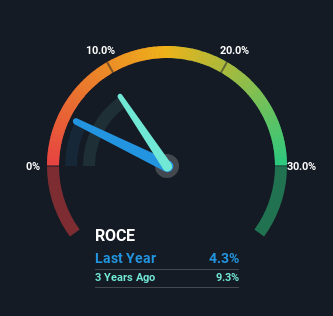Did you know there are some financial metrics that can provide clues of a potential multi-bagger? One common approach is to try and find a company with returns on capital employed (ROCE) that are increasing, in conjunction with a growing amount of capital employed. Ultimately, this demonstrates that it's a business that is reinvesting profits at increasing rates of return. However, after briefly looking over the numbers, we don't think HBIS (SZSE:000709) has the makings of a multi-bagger going forward, but let's have a look at why that may be.
Return On Capital Employed (ROCE): What Is It?
If you haven't worked with ROCE before, it measures the 'return' (pre-tax profit) a company generates from capital employed in its business. The formula for this calculation on HBIS is:
Return on Capital Employed = Earnings Before Interest and Tax (EBIT) ÷ (Total Assets - Current Liabilities)
0.043 = CN¥5.5b ÷ (CN¥272b - CN¥146b) (Based on the trailing twelve months to September 2024).
So, HBIS has an ROCE of 4.3%. In absolute terms, that's a low return and it also under-performs the Metals and Mining industry average of 6.7%.
Check out our latest analysis for HBIS

Above you can see how the current ROCE for HBIS compares to its prior returns on capital, but there's only so much you can tell from the past. If you'd like, you can check out the forecasts from the analysts covering HBIS for free.
What Does the ROCE Trend For HBIS Tell Us?
On the surface, the trend of ROCE at HBIS doesn't inspire confidence. Around five years ago the returns on capital were 9.4%, but since then they've fallen to 4.3%. On the other hand, the company has been employing more capital without a corresponding improvement in sales in the last year, which could suggest these investments are longer term plays. It may take some time before the company starts to see any change in earnings from these investments.
On a side note, HBIS' current liabilities are still rather high at 54% of total assets. This effectively means that suppliers (or short-term creditors) are funding a large portion of the business, so just be aware that this can introduce some elements of risk. Ideally we'd like to see this reduce as that would mean fewer obligations bearing risks.
The Bottom Line
To conclude, we've found that HBIS is reinvesting in the business, but returns have been falling. Unsurprisingly, the stock has only gained 20% over the last five years, which potentially indicates that investors are accounting for this going forward. As a result, if you're hunting for a multi-bagger, we think you'd have more luck elsewhere.
One final note, you should learn about the 3 warning signs we've spotted with HBIS (including 1 which can't be ignored) .
While HBIS isn't earning the highest return, check out this free list of companies that are earning high returns on equity with solid balance sheets.
Valuation is complex, but we're here to simplify it.
Discover if HBIS might be undervalued or overvalued with our detailed analysis, featuring fair value estimates, potential risks, dividends, insider trades, and its financial condition.
Access Free AnalysisHave feedback on this article? Concerned about the content? Get in touch with us directly. Alternatively, email editorial-team (at) simplywallst.com.
This article by Simply Wall St is general in nature. We provide commentary based on historical data and analyst forecasts only using an unbiased methodology and our articles are not intended to be financial advice. It does not constitute a recommendation to buy or sell any stock, and does not take account of your objectives, or your financial situation. We aim to bring you long-term focused analysis driven by fundamental data. Note that our analysis may not factor in the latest price-sensitive company announcements or qualitative material. Simply Wall St has no position in any stocks mentioned.
About SZSE:000709
HBIS
Hbis Company Limited produces and sells steel products in China and internationally.
Fair value with moderate growth potential.
Similar Companies
Market Insights
Community Narratives



